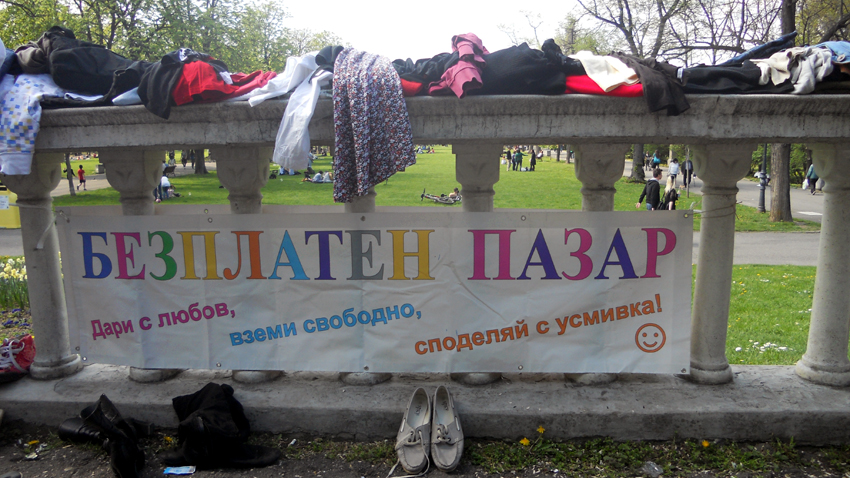A “free market” was organized at the end of last week in Boris’ Garden in Sofia. At 3 PM sharp on Sunday, enthusiasts started arranging belongings they no longer needed on the benches near the famed lily pond. People were giving things away to passers by absolutely free. Anyone could choose anything that took their fancy and take it home without paying for it. Spirits ran high, people were obviously enjoying themselves and few went away empty handed. What was junk to some was a treasure to others. And many said this market was not charity, but a way to show solidarity because there is enough to go round and there is no sense clogging our homes with belongings or filling our wardrobes with clothes we have only put on once!
Here is one of the organizers of the event Valentina Mincheva, a volunteer at the “Free centre for free people” with more about this initiative:
“We exchange our belongings and it is free. You may leave two books but take nothing. Or you might not leave anything but take away something you need. People have been bringing all sorts of things – household appliances, clothes, books, CDs. We are thinking of making this a monthly event, but at a different venue in the city every time. Each person leaves what he or she doesn’t need anymore for someone else to pick up.”

Just fifteen minutes after the market opened, the more presentable belongings had changed hands. Of course, people thronged to the new and flashy things, especially clothes. But ultimately people ceded and the commodities most in demand went to those who needed them most. As a matter of fact the idea of a “free market” is to demonstrate that strangers are capable of creating bonds of friendship, that the most important things in life are not to be bought, that sharing is more satisfying than making money.
Three young men had come to spend the sunny Sunday afternoon here and to give some of their belongings to strangers:
“I brought a backpack full of books, a laundry basket and a bagful of toys that belonged to my brother,” says Ignat Ignatov, while Kaloyan Velinov adds:
“Teddy bears, cars. Together with my girlfriend we brought old clothes, jewellery, even a hand operated sewing machine. They were grabbed in an instant, I was really surprised. The things that were new went like hot cakes.”

Two young ladies were taking a stroll around the market, books in hand which they say they had “adopted”. This was their first time at such a market and they had not brought anything:
“We came to look around and the things we liked we took. I got a book “Beginners’ pendulum: the power to achieve all goals”, says Ralitsa and her friend Anna adds:
“I took a textbook on corporate accounting, I used it during my university studies and now I thought I would reread it.”
English Milena Daynova
Photos: Luisa LazarovaAccording to the Annual Report on the Health Status of Bulgarian Citizens for 2023, t he main cause of death in Bulgaria is diseases of the cardiovascular system (61.1%), followed by oncological diseases (16.5%) and diseases of the respiratory system..
In the week of St. Andrew’s Day (also known as Bears’ Day or Mechkinden), WWF is drawing attention to six orphaned bear cubs who have been given a second chance at life. The initiative is part of the "Subscribe to Nature" campaign and..
For the 30th consecutive year, the Bulgarian Posts organize a contest for the most beautiful letter to Santa Claus. Letters must be sent by 18 December with a stamped envelope "For Santa", the sender's address indicated and postage paid. All..
In the week of St. Andrew’s Day (also known as Bears’ Day or Mechkinden), WWF is drawing attention to six orphaned bear cubs who have been given a..
According to the Annual Report on the Health Status of Bulgarian Citizens for 2023, t he main cause of death in Bulgaria is diseases of the..

+359 2 9336 661
